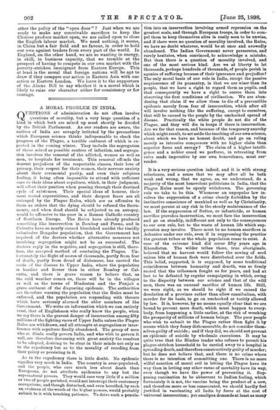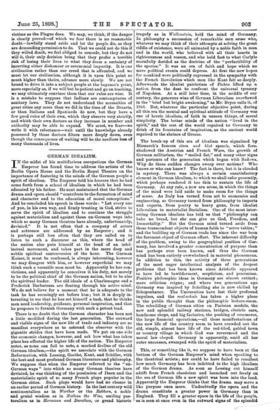A MORAL PROBLEM IN INDIA.
QUESTIONS of administration do not often involve questions of morality, but a very large question of a kind in which both are mixed up must shortly be decided by the British Parliament. As our readers are aware, the natives of India are savagely irritated by the precautions which European science thinks indispensable to check the progress of the Plague, a terrible outburst of which is ex- pected in the coming winter. They include the segregation of those seized as possible centres of infection, and segrega- tion involves the removal of the afflicted, women as well as men, to hospitals for treatment. This removal offends the dearest prejudices of the respectable classes, their love of privacy, their respect for their women, their nervous anxiety about their ceremonial purity, and even their religious feeling, it being often impossible to attend with sufficient care to their ideas about sepulture, which, in their judgment, will affect their position when passing through their destined cycle of existences. Their special ideas of honour, their most rooted superstitions, and their deepest fears are all outraged by the Plague Rules, which are as offensive to them as orders that the dying should be refused the Sacra- ments, and when dead should be subjected to an autopsy, would be offensive to the poor in a Roman Catholic country of Southern Europe. The Rules have already produced something like insurrection in Bombay and Poona, and in Calcutta have so nearly caused bloodshed amidst the timidly submissive Bengalee population, that the Government has inquired of the doctors whether alternative measures not involving segregation might not be as successful. The doctors reply in the negative, and segregation is still, there- fore, the accepted method of combating the Plague. Un- fortunately the flight of scores of thousands, partly from fear of death, partly from dread of dishonour, has carried the seeds of the disease to Upper India, where the population is hardier and fiercer than in either Bombay or Cal- cutta, and there is grave reason to believe that, as the cold weather comes on, there will be in the villages as well as the towns of Hindostan and the Punjab a grave outburst of the disgusting epidemic. The authorities are therefore warning the population that the Rules must be enforced, and the population are responding with threats which have seriously alarmed the abler members of the Government. We write on information which we can entirely trust, that of Englishmen who really know the people, when we say there is the gravest danger of insurrection among fifty millions of the fighting races of Upper India unless the Plague Rules are withdrawn, and all attempts at segregation or inter- ference with sepulture finally abandoned. The group of men who at Simla really govern India, and who wish to govern it well, are therefore discussing with great anxiety the resolves to be adopted, desiring to be clear in their minds not only as to the expediency but as to the morality of receding from their policy or persisting in it.
As to the expediency there is little doubt. No epidemic signifies very much in India. The country is over-populated, and the people, who care much less about death than Europeans, do not attribute epidemics to any but the supernatural powers. They would care very little if a million or two of people perished, would not interrupt their customary occupations, and though disturbed, and even horrified, by such an evidence of the wrath of the higher powers, would probably submit to it with touching patience. To drive such a poinda- tion into an insurrection involving armed repression on the greatest scale, and through European troops, in order to com- pel them to keep themselves alive is easily seen to be unwise, and if there were no question of morality involved, the Rules, we have no doubt whatever, would be at once and avowedly abandoned.. The Indian Government never persecutes, and rarely hesitates, when convinced, to acknowledge a mistake. But then there is a question of morality involved, and one of the most serious kind. Are we at liberty to let thousands, perhaps hundreds of thousands, of people perish in agonies of suffering because of their ignorance and prejudice? The only moral basis of our rule in India, except the passive acquiescence of its peasantry, is that we are wiser than its people, that we have a right to regard them as pupils, and that consequently we have a right to coerce them into observing the first conditions of civilisation. We are aban- doning that claim if we allow them to die of a preventible epidemic merely from fear of insurrection, which after all will involve nothing like the suffering, except to ourselves, that will be caused to the people by the unchecked spread of disease. Practically the white people do not die of the Plague, and they will die in heaps if there is insurrection. Are we for that reason, and because of the temporary anarchy which might result, to set aside the teaching of our own science, about which we have no honest doubt, and go on ruling merely as intrusive conquerors with no higher claim than superior force and energy P The claim of a higher intelli- gence and a nobler creed we perforce, in retreating from rules made imperative by our own benevolence, must sur- render.
It is a very serious question indeed, and it is with strong reluctance, and a sense that we may after all be both weak and wrong, that we agree, as, we understand, do a majority of the most benevolent politicians in India, that the Plague Rules must be openly withdrawn. The governing rule we take to be this. Whenever an unpopular law in- volves the suppression of a crime clearly forbidden by the instinctive conscience of mankind as well as by Christianity, we must persist at any risk in the steady maintenance of the law. If the suppression of Settee, or infanticide, or human sacrifice provokes insurrection, we must face the insurrection and go on steadily, indifferent not only to the consequences to our own rule, but to the waste of human life which sup- pression may involve. There must be no human sacrifices in Asbantee under our rule, even if in suppressing the practice the greatest tribes or the whole population cease to exist. A case of the extreme kind did occur fifty years ago in Khondistan. The wilder tribes there, true aboriginals, believed that no harvest would follow the sowing of seed unless bits of human flesh were distributed over the fields. This belief, supported, it is supposed, by some traditional coincidences between humanity and dearth, was so firmly rooted that the tribesmen fought us for years, and had at last to be defeated by regular campaigning in which, owing to the disparity between our science and that of the wild men, there was an unusual sacrifice of human life. Still, we were right, as we should be right if we caused the desolation of a province rather than allow cannibalism, with murder for its basis, to go on unchecked or tacitly allowed by law. It is, however, by no means equally clear that we are bound to prevent mere death, which must happen to every- body, from happening a little earlier, at the risk of wrecking the prosperity of millions of human beings. The poor people who wish to submit to the Plague rather than fight it by means which they fancy dishonourable, do not consider them- selves guilty of suicide ; and if they did, we should not prevent an epidemic of suicide by wholesale executions. It may be quite true that the Hindoo trader who refuses to permit his plague-stricken household to be carried away to a hospital is spreading death, and therefore constructively guilty of murder; but he does not believe that, and there is no crime where there is no intention of committing one. There is no more wilful sanction of moral evil in letting the Plague have its way than in letting any other cause of mortality have its way, even though we have the power of preventing it. Sup- posing vaccination to be abhorrent to Indian feeling, which fortunately it is not, the vaccine being the product of a cow, and therefore more or less consecrated, we should hardly feel justified in vaccinating all India by force at the cost of universal insurrection; yet smallpox demands at least as many
victims as the Plague does. We may, we think, if the danger is clearly proved—of which we fear there is no reasonable doubt—lawfully stand aside and let the people die, as they are demanding permission to do. That we could not do this if they willed death, we feel obliged to concede, but they do not will it, their only decision being that they prefer a terrible risk of losing their lives to what they deem a certainty of incurring either dishonour or ceremonial impurity. It is our civilisation rather than our creed that is affronted, and we must let our civilisation, although it is upon this point so much higher than theirs, advance more slowly. We are not bound to drive it into a subject people at the bayonet's point, more especially as, if we will but be patient and go on teaching, we may ultimately convince them that our roles are wise. It is a mistake to suppose that Indians are contemptuous of sanitary laws. They do not understand the necessities of great cities any more than we did in the time of the Stuarts, or than Italians and Spaniards do now, but they have a few good rules of their own, which they observe very strictly, and which their own doctors as they increase in number and authority may be able to expand. We must, we fear—we write it with reluctance—wait until the knowledge already possessed by those doctors filters more deeply down, even though the consequence of waiting will be. the needless loss of many thousands of lives.



















































 Previous page
Previous page